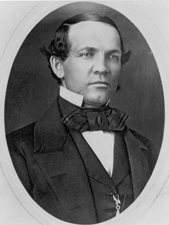Charles E. Stuart
Charles Edward Stuart (born November 25, 1810 in Columbia County , New York , † May 19, 1887 in Kalamazoo , Michigan ) was an American politician ( Democratic Party ) who represented the state of Michigan in both chambers of the US Congress .
After studying law , Charles Stuart was admitted to the bar in 1832 and began practicing in Waterloo . In 1835 he moved to Michigan and settled in Kalamazoo. His political career began in 1842 with membership in the Michigan House of Representatives . After Edward Bradley's death , Stuart was elected to succeed him in the United States House of Representatives. He represented the 2nd Congressional constituency of Michigan from December 6, 1847 to March 3, 1849. When trying to re-elect he was defeated by Whig William Sprague , whom he was able to defeat two years later, followed by two more years in the House of Representatives.
Within the Congress, Stuart moved to the Senate on March 4, 1853 , where he replaced Alpheus Felch . During his six-year term of office, he acted briefly on June 9 and 10, 1856, as President of the Senate pro tempore . He did not run for re-election and ran unsuccessfully for governor of Michigan in 1858 ; the election was won by the Republican Moses Wisner .
As a result, Stuart worked again as a lawyer in Kalamazoo. In 1860 he was his state delegate to the Democratic National Convention . During the Civil War he set up a volunteer regiment for the infantry and was also appointed its commander with the rank of colonel , but had to resign from this task due to health problems.
Charles Stuart died in Kalamazoo in 1887. His home on Stuart Avenue was listed on the National Register of Historic Places , as was the Stuart Area Historic District that surrounds the house .
Web links
- Charles E. Stuart in the Biographical Directory of the United States Congress (English)
- Charles E. Stuart in the database of Find a Grave (English)
| personal data | |
|---|---|
| SURNAME | Stuart, Charles E. |
| ALTERNATIVE NAMES | Stuart, Charles Edward (full name) |
| BRIEF DESCRIPTION | American politician (Democratic Party) |
| DATE OF BIRTH | November 25, 1810 |
| PLACE OF BIRTH | Columbia County , New York |
| DATE OF DEATH | May 19, 1887 |
| Place of death | Kalamazoo , Michigan |



